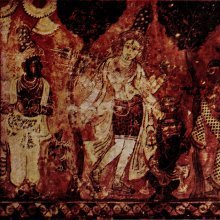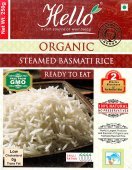Rice, Ṛce: 4 definitions
Introduction:
Rice means something in Hinduism, Sanskrit, biology. If you want to know the exact meaning, history, etymology or English translation of this term then check out the descriptions on this page. Add your comment or reference to a book if you want to contribute to this summary article.
Images (photo gallery)
(+10 more images available)
In Hinduism
Ayurveda (science of life)
Veterinary Medicine (The study and treatment of Animals)
Source: Asian Agri-History: Paśu Āyurvēda (Veterinary Medicine) in GaruḍapurāṇaRice (in Sanskrit: śalyanna) is part of the diet in the treatment of horses, according to sections on the treatment of Horses (Gajāyurveda or Aśvāyurveda) in the Garuḍapurāṇa.—The diet also plays a role during the treatment because the food imparts a greater strength and vigour to the horses and acts as a general prophylactic against diseases. The following diets are mentioned for the horses in Garuḍapurāṇa, which are according to the doṣa: [...] The diet in vātaja-vikāra: The dugdha (milk) and śalyanna (rice) is the ideal diet in vātaja-vikāra. [...]

Āyurveda (आयुर्वेद, ayurveda) is a branch of Indian science dealing with medicine, herbalism, taxology, anatomy, surgery, alchemy and related topics. Traditional practice of Āyurveda in ancient India dates back to at least the first millenium BC. Literature is commonly written in Sanskrit using various poetic metres.
Purana and Itihasa (epic history)
Source: Shodhganga: Elements of Art and Architecture in the Trtiyakhanda of the VisnudharmottarapuranaRice and Flowers were coloured and used to create various designs for decorating Mansions or Temples, as part of the “sixty four kinds of Art”, according to the Kamasutra of Vatsyayana.—Cf. the Sanskrit Taṇḍulakusumavalivikāra.—Indian tradition, basically includes sixty four Art forms are acknowledged. The history of Indian Art covers approximately five thousand years which presents a rich and almost continuous record. The references of sixty four kinds of Kala (कला, kalā) are found in the Bhagavatapurana, Shaiva-Tantras, Kamasutra of Vatsyayana etc.

The Purana (पुराण, purāṇas) refers to Sanskrit literature preserving ancient India’s vast cultural history, including historical legends, religious ceremonies, various arts and sciences. The eighteen mahapuranas total over 400,000 shlokas (metrical couplets) and date to at least several centuries BCE.
Biology (plants and animals)
Source: Google Books: CRC World Dictionary (Regional names)Rice in English is the name of a plant defined with Oryza sativa in various botanical sources. This page contains potential references in Ayurveda, modern medicine, and other folk traditions or local practices It has the synonym Oryza sativa var. suberythroceros Kanevsk (among others).
Example references for further research on medicinal uses or toxicity (see latin names for full list):
· Acta Genetica Sinica (1984)
· Kromosomo
· Flora Cochinchinensis (1790)
· Acta Genetica Sinica (1990)
· Blumea (1987)
· Bulletin de la Société d’Histoire Naturelle d’Autun (1893)
If you are looking for specific details regarding Rice, for example side effects, health benefits, chemical composition, pregnancy safety, diet and recipes, extract dosage, have a look at these references.

This sections includes definitions from the five kingdoms of living things: Animals, Plants, Fungi, Protists and Monera. It will include both the official binomial nomenclature (scientific names usually in Latin) as well as regional spellings and variants.
Languages of India and abroad
Kannada-English dictionary
Source: Alar: Kannada-English corpusṚce (ಋಚೆ):—[noun] = ಋಚ [rica].
--- OR ---
Rice (ರಿಚೆ):—
1) [noun] a sacred verse recited in praise of a deity.
2) [noun] a verse recited while blessing a person.
Kannada is a Dravidian language (as opposed to the Indo-European language family) mainly spoken in the southwestern region of India.
See also (Relevant definitions)
Starts with: Rice bean, Rice flour jar, Rice grass, Rice plant, Rice-paper tree, Rice-water, Riceflower, Ricegrass, Ricepaper plant, Ricepu, Ricevel, Riceyu.
Ends with (+19): American licorice, Annual wild rice, Aprice, Barn rice, Bengal wild rice, Brown-beard rice, Canadian wild rice, Chinese licorice, Common licorice, Common wild rice, Husked rice, Indian licorice, Indian liquorice, Jamaica liquorice, Jungle rice, Kalurice, Karice, Liquorice, Manchurian licorice, Manchurian water rice.
Full-text (+5075): Shali, Tandula, Odana, Vrihi, Akshata, Payasa, Kura, Shashtika, Hayana, Nivara, Prithuka, Paramanna, Stambakari, Tilaudana, Brahmaudana, Kalama, Navanna, Sukshmashali, Krisara, Siddhajala.
Relevant text
Search found 328 books and stories containing Rice, Ṛce, Rce; (plurals include: Rices, Ṛces, Rces). You can also click to the full overview containing English textual excerpts. Below are direct links for the most relevant articles:
Charaka Samhita (English translation) (by Shree Gulabkunverba Ayurvedic Society)
Chapter 27a - The group of awned cereals (Shukadhanya—monocotyledons) < [Sutrasthana (Sutra Sthana) — General Principles]
Chapter 2b - Milk-saturated rice and other preparations (asikta-ksirika) < [Cikitsasthana (Cikitsa Sthana) — Section on Therapeutics]
Chapter 27k - The group of Cooked foods (Kritanna) < [Sutrasthana (Sutra Sthana) — General Principles]
Mimamsa interpretation of Vedic Injunctions (Vidhi) (by Shreebas Debnath)
Chapter 8 - Niyamavidhi (Introduction)
Chapter 4.4 - Divisions of Subsidiary Actions and Subsidiary Matters
Rig Veda (translation and commentary) (by H. H. Wilson)
Tiruvaymoli (Thiruvaimozhi): English translation (by S. Satyamurthi Ayyangar)
Pasuram 10.9.5 < [Section 9 - Ninth Tiruvaymoli (Cul vicumpu ani mukil)]
Introduction to Section 1.9 < [Section 9 - Ninth Tiruvaymoli (Ivaiyum avaiyum)]
Pasuram 9.5.8 < [Section 5 - Fifth Tiruvaymoli (Innuyirc cevalum)]
Brihadaranyaka Upanishad (by Swāmī Mādhavānanda)
Section I - Yajnavalkya and Asvala < [Chapter III]
Section III - The Prana: Its Glories and Redeeming Power < [Chapter I]
Section VI - Meditation on Brahman as the Mind < [Chapter V]
The Shiva Purana (by J. L. Shastri)
Chapter 7 - The greatness of Nandikeśvara < [Section 4 - Koṭirudra-Saṃhitā]
Chapter 16 - Different modes of worship of clay idols and their results < [Section 1 - Vidyeśvara-saṃhitā]
Chapter 14 - Description of Fire-sacrifice (agniyajña), etc. < [Section 1 - Vidyeśvara-saṃhitā]
Related products
(+65 more products available)











